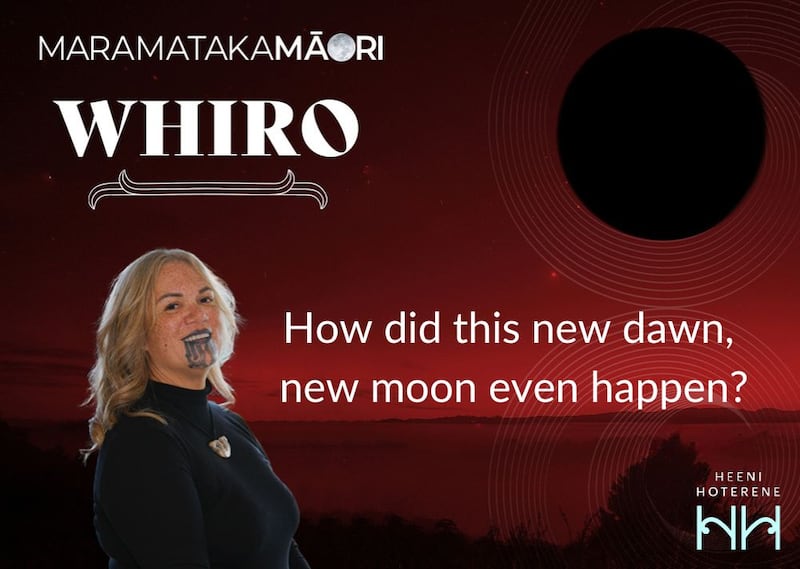Matariki - the mother star of the winter constellation- is closely linked to health and wellbeing.
Now in its fourth year as a national holiday, awareness of Matariki and mātauranga Māori has grown across the motu, as more Kiwis tune in to the messages of the taiao, there’s a clear shift toward holistic frameworks of wellbeing that reflect Māori ways of living.
“The last five years has been a growing commitment from not just iwi but Tauiwi as well,” says Maramataka practitioner Ayla Hoeta (Waikato, Tainui, Ngāti Tahinga, Ngāti Tamaoho).
She says many non-Māori are increasingly interested, reflecting a genuine commitment to being better Tangata Tiriti.
“It’s not just Matariki - it’s Matariki mā Puanga. And through that, Maramataka has become encompassing of those tohu.”
Matariki mā Puanga✨
Posted by Living by The Stars with Professor Rangi Matamua on Thursday, June 19, 2025
He rauemi taiao ki te ao matihiko
Thousands of people now gather across the motu for Hautapu ceremonies each year, and Hoeta says resources around Matariki are now more accessible than ever before.
With more than 12,000 followers online, Hoeta has been instrumental in sharing mātauranga through digital platforms.
“We launched an app this year called Ao Maarama, and it’s a holistic way to attune to your own oranga, hauora [and] whare tapa whā using Maramataka,” she says.
“This is something accessible to everyone, and it’s free. People really want to know - how can I align myself better to my mauri, to my wellbeing.”
Since launching in February, Ao Maarama has had over 5,000 organic downloads.
Te hokinga ki ngā tikanga hauora Māori
While the celebration of Matariki continues to grow, many reflect on the ongoing health inequities faced by Māori in mainstream systems. For some, this has been a key factor in the revival of traditional Māori wellbeing approaches.
According to a report by Te Whatu Ora, around 38% of Māori adults have experienced at least one unmet primary healthcare need, such as delays in seeing a GP, cost barriers, or trouble accessing prescriptions or transport, compared to 32% of non-Māori adults.
Maramataka practitioner Heeni Hoterene (Ngāti Hine, Ngāpuhi, Ngāti Raukawa ki te Tonga, Ngāi Tahu) states that deep distrust in the health system persists within Māori communities.
“Aroha au ki a tātau te iwi Māori kua whakamataku mārika ki te haere ki te tākuta, ki te kōrero atu ki te rata,” she adds.
“Ko te tino mate o te hohipera, kei raro i ngā ture o te Kāwanatanga - hore he paku āwhina, [he] paku mōhiotanga ki ngā tikanga o tātau te iwi Māori.”
For Hoterene, embracing maramataka is not just about spiritual connection - it requires action too.
“Kaua e titiro noa ki ngā whetū me te tūmanako ka puta noa - mā te kaha o te mahi ka tutuki pai.”
“Ko te hauora o te tinana, te wairua, te hinengaro - ko tērā te tino taiao o tātau.”

Mātauranga Māori for all
Hoterene says she didn’t grow up with knowledge of maramataka herself.
“I te wā i haere au ki te kura wānanga o Wikitoria, he paku noa ngā kōrero mō te hī ika me te mahi kai.”
But despite the growing awareness, she says Māori have carried the bulk of this revival on their shoulders.
“Ko te katoa o tēnei mātauranga kua taea te whāngai ki te iwi whānui nā te tino hiahia o te iwi whānui.”
“He tauira anō ki a tātau te iwi Māori - me kaua e waiho [kia] te tukuna mai i te pūtea mai i te Karauna kia mahi i ngā mahi.”
Today, she works alongside both government agencies and major corporations, from the Ministry of Justice to BNZ and One NZ, helping bring mātauranga Māori into wider spaces.
“I tēnei wā kua tino kaha te hiahia o te hunga kore mōhio kia mārama nei.”
“Ko te kōrero o te maramataka, he kōrero ka taea ki te honohono i ngā tāngata katoa.”
With many sharing their aspirations for the new lunar year, Hoeta’s hopes for the future,
“Living by the Maramataka, the same way we live by our Gregorian calendars as a nation.”



